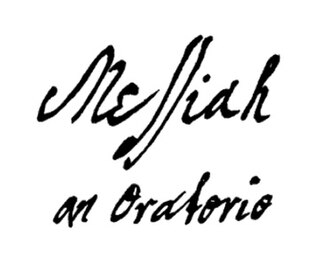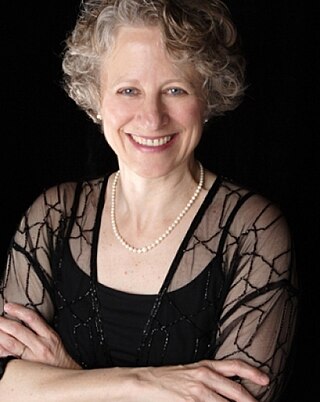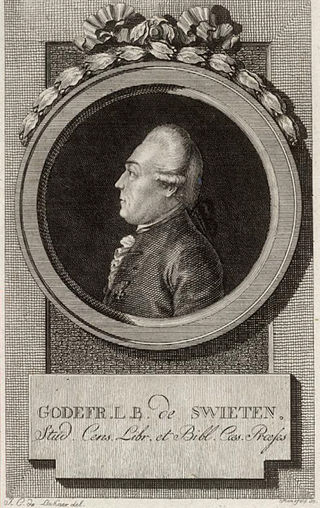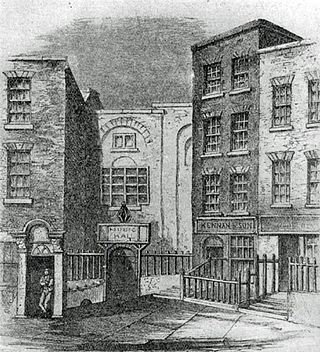
Messiah is an English-language oratorio composed in 1741 by George Frideric Handel. The text was compiled from the King James Bible and the Coverdale Psalter by Charles Jennens. It was first performed in Dublin on 13 April 1742 and received its London premiere a year later. After an initially modest public reception, the oratorio gained in popularity, eventually becoming one of the best-known and most frequently performed choral works in Western music.

Hill Auditorium is the largest performance venue on the University of Michigan campus, in Ann Arbor, Michigan. The auditorium was named in honor of Arthur Hill (1847-1909), who served as a regent of the university from 1901 to 1909. He bequeathed $200,000 to the university for the construction of a venue for lectures, musical performances, and other large productions. Opened in 1913, the auditorium was designed by Albert Kahn and Associates. It was renovated by the same firm beginning in 2002 and was re-opened in 2004.

The School of Music, Theatre, and Dance is the undergraduate and graduate school for the performing arts of the University of Michigan, in Ann Arbor, Michigan, United States.
The culture of Ann Arbor, Michigan includes various attractions and events, many of which are connected with the University of Michigan.

The Handel and Haydn Society is an American chorus and period instrument orchestra based in Boston, Massachusetts. Known colloquially as 'H+H', the organization has been in continual performance since its founding in 1815, the longest serving such performing arts organization in the United States.

The Radcliffe Choral Society(RCS) is a 60-voice treble choral ensemble at Harvard University. Founded in 1899, it is one of the country's oldest soprano-alto choruses and one of its most prominent collegiate choirs. With the tenor-bass Harvard Glee Club and the mixed-voice Harvard-Radcliffe Collegium Musicum, it is one of the Harvard Choruses. All three groups are led by Harvard Director of Choral Activities Andrew Clark. The RCS Resident Conductor is Elizabeth Eschen. RCS tours domestically every year and travels internationally every four years.

Melinda O'Neal is a conductor of choral and choral-orchestral music, professor emerita of music, and author.

John Reilly Lewis was an American choral conductor who founded the Washington Bach Consort and was the music director of the Cathedral Choral Society. As a keyboard artist he specialised in baroque music, particularly the music of J. S. Bach.
Saint Peter's Singers (SPS) is a chamber choir associated with Leeds Minster, Leeds, West Yorkshire, England that celebrated during the Season 2017/2018 the fortieth anniversary of the choir's formation by Harry Fearnley in 1977. An anniversary concert took place at Leeds Minster on Sunday 25 June 2017 with the National Festival Orchestra and soloists Kristina James, Joanna Gamble, Paul Dutton and Quentin Brown. Further anniversary year events included Bach Cantatas and Music for Christmas at Fulneck Church in August and December respectively, Handel Coronation Anthems at Holy Trinity, Boar Lane as part of the Leeds Handel Festival in September and a tour of East Anglia in October. In November at Leeds Town Hall, the Singers participated in Herbert Howells's masterpiece Hymnus Paradisi with Leeds Philharmonic Chorus and Leeds College of Music Chorale under the direction of Dr David Hill with the Orchestra of Opera North. 2018 began with a concert of Sacred Choral Masterworks at Leeds Town Hall in February and Bach's Mass in B minor at Leeds Minster on Good Friday 2018 in memory of long-serving member Jan Holdstock. The final concert of the current season takes place at Leeds Minster on Sunday 24 June at Leeds Minster at 5.30. At this event will be presented the first performance of a new work from composer Philip Moore commissioned for the Singers' 40th anniversary – the motet Tu es Petrus – along with music by E W Naylor, Arvo Part, Sir Hubert Parry, Judith Bingham and Maurice Durufle.

Derby Choral Union is one of the UK’s longest standing choral societies having been formed in 1866. The choir was established to perform choral music of the highest quality, a tradition it strives to maintain to this day. The repertoire includes traditional choral works as well as music by 20th-century and more contemporary composers. Derby Choral Union is a registered charity and an independent choral society. It promotes concerts in Derby, England, and the surrounding district, and has over 100 active members.
Royal Melbourne Philharmonic (RMP) is a 120-voice choir and orchestra in Melbourne, Victoria, Australia. It was established in 1853, and is reportedly Australia's oldest surviving cultural organisation. The Royal Melbourne Philharmonic is Australia's oldest musical organisation that has been continuously existing for over 150 years. Among its programmes, there have been large-scale concerts celebrating classical composers including Bach, Mendelssohn and Beethoven. The Royal Melbourne Philharmonic is managed under the direction of Andrew Wailes, the artistic director of the orchestra.
Sheffield Bach Society was founded in 1950 to commemorate the 200th anniversary of the death of J S Bach in Leipzig, and to bring the music of Bach to Sheffield audiences. Its current conductor is Philip Collin, who has been the conductor since September 2023.
Bath Bach Choir, formerly The City of Bath Bach Choir (CBBC), is based in Bath, Somerset, England, and is a registered charity. Founded in 1946 by Cuthbert Bates, who also became a founding father of the Bath Bach Festival in 1950, the choir's original aim was to promote the music of Johann Sebastian Bach via periodic music festivals. Bates – an amateur musician with a great love and understanding of this composer's works – was also the CBBC's principal conductor and continued in this role until his sudden death, in April 1980. This untimely exit pre-empted his planned retirement concert performance of J. S. Bach's Mass in B minor, scheduled for July of the same year, and effectively ended the first period of the choir's history.
The Choral Arts Society of Washington is a major choral organization based in Washington, D.C. Founded in 1965 by Norman Scribner, it is regarded as one of the premier symphonic choruses in the United States. The Choral Arts Society of Washington consists of three vocal ensembles; the Choral Arts Chorus, the Choral Arts Chamber Singers, and the Choral Arts Youth Choir.
The Atlanta Baroque Orchestra (ABO), founded in 1997 in Atlanta, Georgia, is the first and oldest professional orchestra in the Southeastern United States of America dedicated to historically informed performance, of music from the Baroque era on period instruments. The Atlanta Baroque Orchestra gave its premiere concert in January, 1998. The first director of the ABO was lute and theorbo player Lyle Nordstrom, who departed in 2003. John Hsu, noted performer on the viola da gamba and baryton, took the title of artistic advisor, becoming artistic director in July 2004; he continued through the 2008/2009 season. From 2004 through 2011, the resident director was founding member Daniel Pyle, harpsichordist and organist, instructor of music at Clayton State University, and organist and choir director at the Anglican Church of Our Saviour in Atlanta. Violinist, Baroque dancer and choreographer Julie Andrijeski became artistic director in February, 2011.
The Toronto Choral Society was founded in 1845. Music was a popular form of entertainment for a rapidly growing and prosperous population, so a group of citizens formed a choral society in order to give concerts and foster the development of the local musical community. F.W. Barron, the headmaster of Upper Canada College, became the choir's first president, and James P. Clarke, organist at St. James Cathedral, was its first conductor.

Yvonne Regina Ciannella was an American coloratura soprano in opera and concert. She began her career performing and recording with the Robert Shaw Chorale in the early 1950s. After graduate voice studies at the Mozarteum in Salzburg, she embarked on a career as an opera singer; working mainly in Germany at the Staatstheater Braunschweig, Theater Bonn, and Theater Dortmund during the 1960s. She also appeared as a guest artist with opera companies in Berlin, Cologne, Florida, Frankfurt, Hamburg, and Vienna. For many years she was a member of the voice faculty of the College of Music at Florida State University.

Der Messias, K. 572, is Wolfgang Amadeus Mozart's 1789 German-language version of Messiah, George Frideric Handel's 1741 oratorio. On the initiative of Gottfried van Swieten, Mozart adapted Handel's work for performances in Vienna.
Our Lady's Choral Society is an Irish choir founded in 1945, composed of members of Catholic church choirs in the Roman Catholic Archdiocese of Dublin. It was founded by Vincent O'Brien, the composer and director of music at St. Mary's Pro-Cathedral, Dublin. Vincent O'Brien was succeeded as musical director by his son Oliver, and in 1979 Oliver O'Brien was succeeded by Proinnsías Ó Duinn. Every year the choir performs Handel's Messiah, in Fishamble Street, Dublin, commemorating the first performance.

Neale's Musick Hall, also known as Mr. Neal's New Musick Hall, the New Musick-Hall, Mr. Neale's Great Room, Neal's Musick Room, the Great Musick Hall, Mr. Neale's Great Musick Hall or the Fishamble Street Music Hall was a purpose-built music hall that existed on Fishamble Street in Dublin city centre. It was built using subscriptions from a charitable organisation named 'The Charitable and Musical Society', and operated from 1741 until the mid-19th century. William Neale, a local musical instrument-maker and music publisher, was the secretary/treasurer of the society during the conception and construction phase of the project. The building is most notable for the premiere of Handel's Messiah which took place within it on the afternoon of 13 April 1742.










